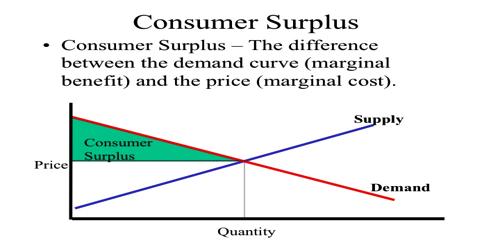Condemnation of Consumer’s Surplus
The concept of consumer’s surplus is one of the most important idea in economic theory especially in demand and welfare economics. It is a measure of the welfare that people gain from consuming goods and services. The concept of consumer’s surplus has been criticized on several grounds as follows:
Imaginary
The concept of consumer’s surplus is a purely imaginary idea. We just imagine what we are prepared to pay and subtract what we actually pay. It is all hypothetical. One may say that one is prepared to pay anything. Hence it is unreal.
Utility is not measurable
The concept of consumer’s surplus is based on the assumption that utility can be measured quantitatively in term of money. But utility is a subjective concept. Besides, different people are prepared to pay different amounts. It would be a hopeless task to put down how much each individual would be willing to pay. Hence the total consumer’s surplus in the market cannot be measured. Therefore, utility cannot be measured quantitatively.
Marginal utility of money not constant
The concept of consumer’s surplus supposes that the marginal utility of money remains constant throughout the process of exchange. But the marginal utility of money does not remain constant. It is pointed out that if the consumer knew that any such thing existed, he would go on buying more and more till the surplus utility he enjoyed disappeared. This is wrong. A consumer does not run after a surplus yielded by one commodity. He has to weigh the utilities of other commodities too.
Not applicable to necessaries
The concept of consumer’s surplus does not apply to necessaries of life or conventional necessaries. The price of necessaries is very low whereas utility derived from them is very high. The idea of Consumer’s Surplus does not apply to the necessaries of life or conventional necessaries. In such cases the surplus is immeasurable. Therefore, consumer’s surplus from them is infinite when a man is dying of thirst, he may be prepared to pay any amount of money for a glass of water.
Neglect complementary commodities
Marshall assumes that the utility of a commodity depends upon the supply of that commodity alone. He neglects the problem of complementary of commodities. Thus, he considers one commodity as independent of the others.
Neglect Substitutes
This concept assumes the absence of substitutes of the commodity from which the consumer derives the surplus because the presence of substitutes like tea and coffee would make the measurement of consumer’s surplus difficult. Another ground on which the concept has been criticized is that the complete and reliable list of demand and prices is never available to the consumer. The demand schedule according to which he regulates and decides his purchases is not necessary to come true in practice. How much the consumer would be willing to pay rather than go without the thing is something hard to answer correctly.
Information Source:
















